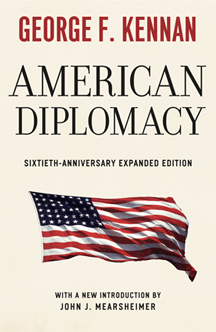By John P. McWilliams
George Kennan’s formulation of the policy of “containment” of Soviet Russia has by common consent been the most influential force in American foreign relations during the second half of the twentieth century. Thousands of undergraduate Political Science majors and would-be governmental officials have read American Diplomacy (1950), or at least “The Sources of Soviet Conduct,” the Foreign Affairs article that in 1947 first set forth the argument for containment. However, to reread the entirety of American Diplomacy in 2012, with the aid of a superb new introduction by John J. Mearsheimer, is to become aware of how Kennan’s original concept of containment was later to be both misunderstood and abused.
A popular image persists of Kennan as a hawkish academic prepared to justify the buildup of military arsenals and even to risk brinksmanship in the service of containing Soviet power. In part the misconception is due to the occasional absolutism of Kennan’s own phrasing, as in his calling for “a policy of firm containment, designed to confront the Russians with unalterable counter-force at every point.” In part, it is due to Walter Lippmann’s dubbing Kennan’s concept of containment a “strategic monstrosity.” But in the main, the misconception derives from confusing Kennan’s model of containment with later historical developments: the assumption that Russia sought military conquest, the terrifying rigidity of the reciprocal arms buildup and even, in some quarters, serious consideration of the “first use” of the atomic or hydrogen bomb as governmental policy. Kennan in fact opposed all three, as both Mearsheimer’s introduction and John Lewis Gaddis’s recent biography of Kennan have demonstrated.
Kennan characterizes himself as a realist distrustful of absolutes in an ever-changing, increasingly insecure world. In 1946, a perplexed State Department had no definable foreign policy toward Russia; Russia was controlled by Stalin and the Communist Party, but Russia had recently been America’s ally in defeating Hitler. Secretary of State George Marshall appointed Kennan Director of the Policy Planning Staff in order to provide a comprehensive policy resolution. Kennan saw Russia as America’s “rival” but not an enemy. He believed in a continuing balance of power between Europe, Russia and America, maintained by a corps of professional diplomats, freed from the dangerous vagaries of public opinion, working together toward reasonable compromise solutions. “Containment” was to be achieved partly through military, but primarily through political and diplomatic means. Russia, he was convinced, could have no practicable interest in military victory over western Europe or America. Not only was Russia still too weak militarily and too imbalanced economically; the Marxist faith that Capitalism contained the seeds of its own destruction meant that “containment” could be sustained for the long term. Kennan reversed the Marxist argument upon itself: “The possibility remains. . . that the Soviet power, like the capitalist world of its conception, bears within it the seeds of its own decay.” The end of the Cold War in 1989 was to prove the prescience of Kennan’s thinking.
In the conduct of foreign affairs, Kennan opposed pacificism, militarism, legalism, moralism, nationalism and nation building. He distrusted isms as much as he distrusted the efficacy of the fledgling United Nations. He saw war in Clausewitzian terms as, at best, a last resort, the continuance of political diplomacy by other means. The five chapters of historical analysis that open American Diplomacy expose the dangers that moralizing, national hubris, and demagogic warmongering had posed for the conduct of American foreign policy from the Spanish American War through World War II. Accordingly, America’s most effective weapon should be, not the admittedly necessary buildup of a military deterrent, not even skilled professional diplomacy, but the example of a healthy, productive culture we might offer to the world. To prepare for our international future in the remainder of the 21st century, American Diplomacy is clearly a book well worth every American’s rereading.
John P. McWilliams (ΦBK, Princeton University, 1962) is a professor of humanities at Middlebury College and a resident member of the Beta of Vermont chapter of Phi Beta Kappa.




